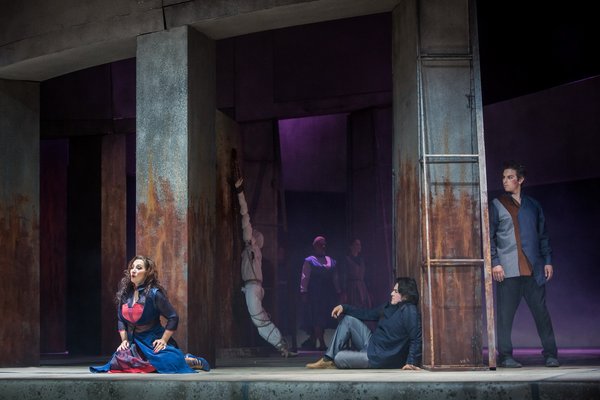
Edgar
1 June 2019, 8 p.m.
In Brief
Opera in two parts, three acts, in Italian, with Hungarian and English surtitles
Puccini's second opera, Edgar, composed early in his career after the success of Le Villi, is also his most rarely performed one. Known primarily for its requiem, the work is rich in dramatic effects and attests to a high level of musical maturity. Set in 14th-century Flanders, its characters are allegorical figures with revealing names, whose relationships transform the story into a moral parable. Prior to the Hungarian State Opera’s 2019 production, Edgar had only been presented in Hungary once. Although we had to wait a decade for the staging, it is now returning to Opera’s programme as a repertoire piece.
THIS PERFORMANCE IS SOLD OUT
Details
- Location
- Eiffel Art Studios – Miklós Bánffy Stage
- Date
- June 1, 2019
- Start time
- 8 p.m.
- End time
- 9:50 p.m.
Synopsis
Act 1
In the square of a Flemish village, Edgar awakens after a long April night of revelry. He is caught in a love triangle of amorous feelings for the gentle Fidelia and passion for the sensual Moorish girl Tigrana. Fidelia’s brother, Frank, also yearns for Tigrana, but she merely mocks him in return.
The Sunday prayers in the church are interrupted by Tigrana’s outrageous singing, and the fiercely aggrieved villagers seize her and are ready to drag the woman, an outsider in the eyes of the community from the beginning, off to be tortured. Edgar intervenes: in order to restrain the villagers, he sets fire to his own house and frees Tigrana. They are about to leave the village forever when Frank suddenly blocks their path. Fidelia and her father, Gualtiero, anxiously watch the two men duel, a fight which ends with Frank being wounded. The crowd curses the fleeing Tigrana and Edgar.
Act 2
In a tavern in another village, Edgar watches Tigrana and the other libertines with disillusionment; with a heavy heart, he recalls that April morning when Fidelia confessed her love for him. The approaching clamour of military music draws his attention, and appearing at the head of the company of soldiers is Frank himself. Edgar decides to seize the opportunity to escape his new and dishonourable life. Reconciling with Frank, he joins his troops. Tigrana pleads with Edgar not to leave her, but he cannot be swayed.
Act 3
Not far from Edgar’s village, a crowd of mourners surround a coffin containing – or so they believe – the body of the heroically fallen Edgar. Frank recalls the dead man’s virtues with words of praise. However, a monk – who is none other than Edgar in disguise – begins to enumerate Edgar’s sins. Only Fidelia comes to the dead man’s defence. Tigrana also daringly attends the funeral in order to bid farewell to her fallen love. The “monk” coerces her into verifying the gravest accusations against the vile Edgar. Just as the outraged crowd is about to set on the sinful man’s dead body, the “monk” reveals his identity. Edgar is ready to start a new life at Fidelia’s side; he curses Tigrana, who is overtaken by the village’s vengeance.
Gallery
Reviews
“Truly rare is the opera in which the music and the libretto are so different in quality as is the case in Edgar. Nevertheless, this production that was just premiered on the Bánffy Stage at the Eiffel Art Studios convinced me that this piece should not be shunned because of the poor, and sometimes outright laughable, libretto. Puccini’s scintillating music – if performed by artists up to the task – deserves considerably more.”
Balázs Csák, Operaportál
